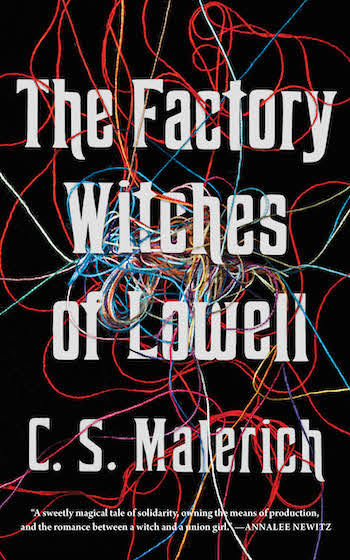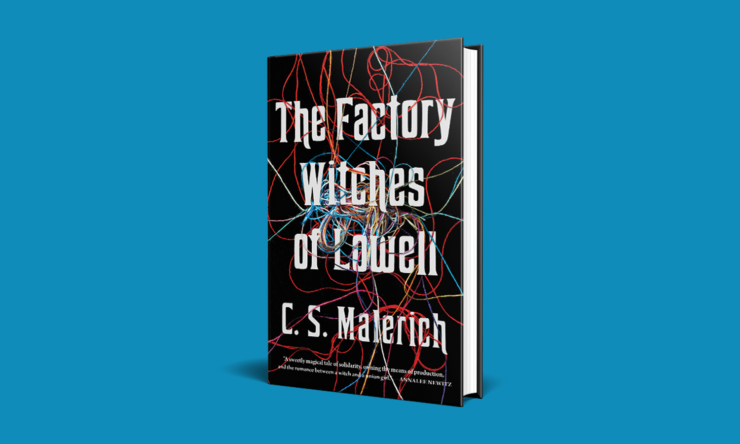The factory girls of Merrimack Mill are finished—finished breaking their backs to fill a rich man’s pockets, finished lining their lungs with sickness, finished playing their roles as good religious girls. And now, they’ve begun something new. In the dead of night, they have gathered in the mill to cast a spell, bidding none of them return to their machines until their demands are met. Safety, decent pay, better hours—it’s not too much to ask. But from cruel bosses and witless middle management to starving families and scabs, the binds of their spell—and their community—will be tested on all sides.
C.S. Malerich’s new novella, The Factory Witches of Lowell, is a charming, hopeful little treat for the queer anti-capitalist witches among us. There’s many a reason to be cynical these days, but Malerich weaves together forgotten histories of labor victories and fantastical possibilities alike with the skill and passion of an awakened proletariat. It has its faults—as all struggles for justice do—but is full of heart, full of promise, and full of girls fighting for each other and, well, for each other.
The Factory Girls’ Union of Lowell are united by more than magic alone. For all the factory bosses’ posturing that they are taking care of the girls—”providing” homes and parks and protections for their eternal souls—it’s obvious that the girls subsist by caring for one another. It is upon this unbreakable bond of community care that they build their union, and that they heal the harms done by the mill. The love story threaded throughout the novella between Judith and Hannah rests on this care—both for one another and for their mutual drive to create better lives for their fellow workers. It’s a grown-up kind of love, but no less sweet and clumsy for it.
Buy the Book


The Factory Witches of Lowell
The magic at the center of Factory Witches is more than a 1:1 metaphor—the magic is the girl’s labor, but it’s also its own entity with its own rules, it’s their life-force, it’s their connection to one another and to the world. The little the novella reveals to us about the nature of magic is fascinating, as is spinning out the implications of it in an otherwise historically-familiar setting.
However, it is with the magic that I found my greatest fault with the story. I was pleased, at first, to see the novella attempt to address the horrors of slavery. One can only see cotton mentioned so many times in a story about liberation before one’s eyes begin darting to the margins of the text. However in its attempts to convey the dehumanization and cruelty of slavery, it uses language that affirms that dehumanization—not in arguing on its behalf, but in implying the enslaved people’s humanity has literally been stolen from them, and that is why they can’t fight back. At best, it is an irresponsible metaphor (one that is applied in lesser but similar terms to the mill workers—different contexts, however, require different language). At worst, it implicitly affirms negative myths and tropes about the institution.
Slavery is at the periphery of Factory Witches—and of course I’m well aware that not every story can tackle every aspect of society. But besides the language discussed above, I think the novella’s length and scope hindered it from being able to adequately address the topic, and that this work should have been done in the plot itself, especially given the failure of both labor history (and leftist economics more broadly) to address issues of race and original accumulation. I could feel the author trying (and the scenes addressing slavery are genuinely affecting) but the problem is—as it so often is—structural.
It would be understandable if this criticism threw readers off of wanting to read the novella, especially if they’d find the content triggering. However overall I did think The Factory Witches of Lowell was lovely apart from that. Its premise is fresh and fun, its characters are grounded and warm, and its tone and message offer a much-needed dose of hope and belief that change is possible. It’s an imperfect project, but not without magic.
The Factory Witches of Lowell is available from Tordotcom Publishing.
Em Nordling is a writer & PhD student in Atlanta, GA.










